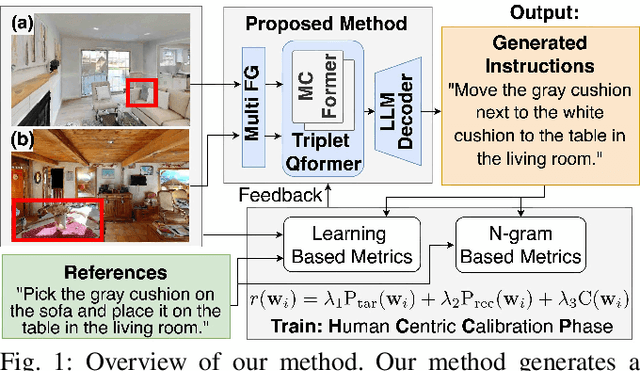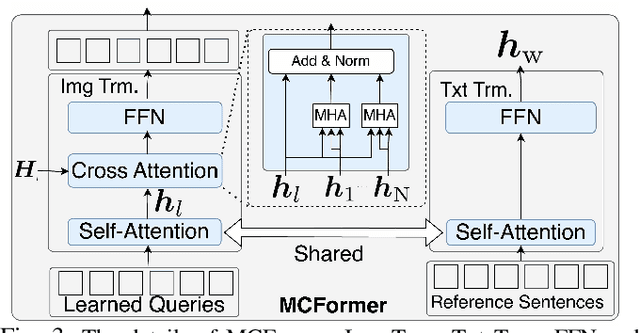Daichi Yashima
Mobile Manipulation Instruction Generation from Multiple Images with Automatic Metric Enhancement
Jan 28, 2025



Abstract:We consider the problem of generating free-form mobile manipulation instructions based on a target object image and receptacle image. Conventional image captioning models are not able to generate appropriate instructions because their architectures are typically optimized for single-image. In this study, we propose a model that handles both the target object and receptacle to generate free-form instruction sentences for mobile manipulation tasks. Moreover, we introduce a novel training method that effectively incorporates the scores from both learning-based and n-gram based automatic evaluation metrics as rewards. This method enables the model to learn the co-occurrence relationships between words and appropriate paraphrases. Results demonstrate that our proposed method outperforms baseline methods including representative multimodal large language models on standard automatic evaluation metrics. Moreover, physical experiments reveal that using our method to augment data on language instructions improves the performance of an existing multimodal language understanding model for mobile manipulation.
Open-Vocabulary Mobile Manipulation Based on Double Relaxed Contrastive Learning with Dense Labeling
Dec 24, 2024



Abstract:Growing labor shortages are increasing the demand for domestic service robots (DSRs) to assist in various settings. In this study, we develop a DSR that transports everyday objects to specified pieces of furniture based on open-vocabulary instructions. Our approach focuses on retrieving images of target objects and receptacles from pre-collected images of indoor environments. For example, given an instruction "Please get the right red towel hanging on the metal towel rack and put it in the white washing machine on the left," the DSR is expected to carry the red towel to the washing machine based on the retrieved images. This is challenging because the correct images should be retrieved from thousands of collected images, which may include many images of similar towels and appliances. To address this, we propose RelaX-Former, which learns diverse and robust representations from among positive, unlabeled positive, and negative samples. We evaluated RelaX-Former on a dataset containing real-world indoor images and human annotated instructions including complex referring expressions. The experimental results demonstrate that RelaX-Former outperformed existing baseline models across standard image retrieval metrics. Moreover, we performed physical experiments using a DSR to evaluate the performance of our approach in a zero-shot transfer setting. The experiments involved the DSR to carry objects to specific receptacles based on open-vocabulary instructions, achieving an overall success rate of 75%.
 Add to Chrome
Add to Chrome Add to Firefox
Add to Firefox Add to Edge
Add to Edge